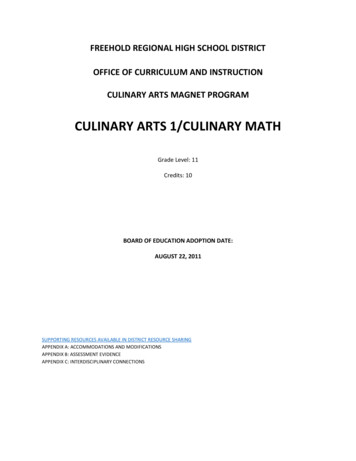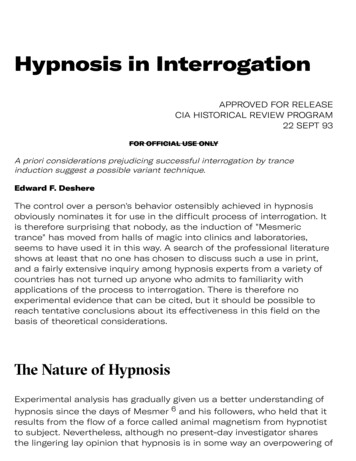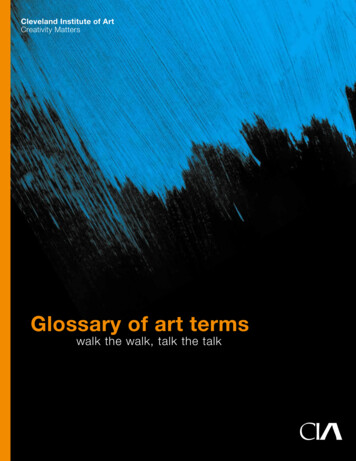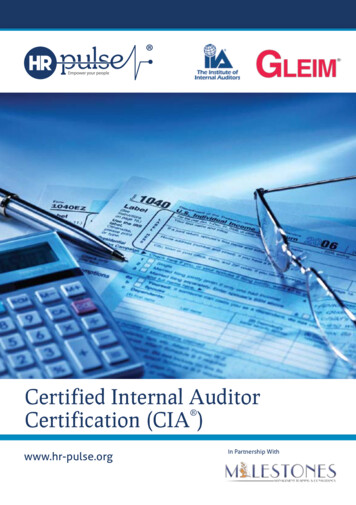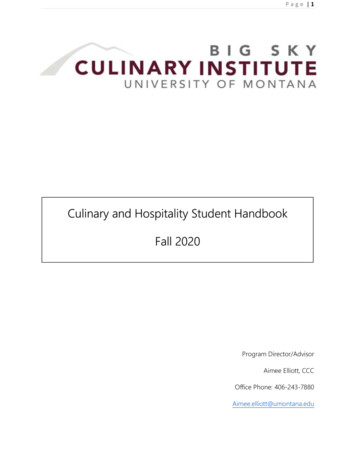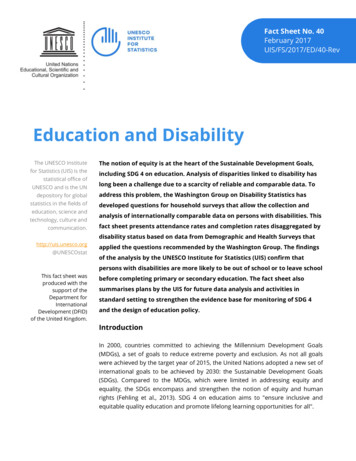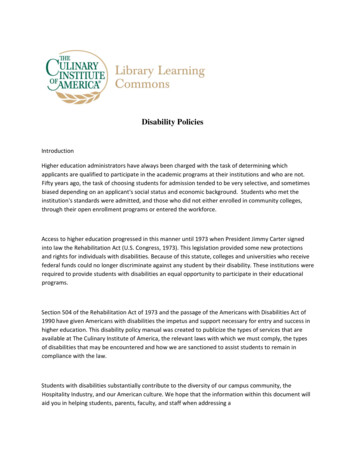
Transcription
Disability PoliciesIntroductionHigher education administrators have always been charged with the task of determining whichapplicants are qualified to participate in the academic programs at their institutions and who are not.Fifty years ago, the task of choosing students for admission tended to be very selective, and sometimesbiased depending on an applicant's social status and economic background. Students who met theinstitution's standards were admitted, and those who did not either enrolled in community colleges,through their open enrollment programs or entered the workforce.Access to higher education progressed in this manner until 1973 when President Jimmy Carter signedinto law the Rehabilitation Act (U.S. Congress, 1973). This legislation provided some new protectionsand rights for individuals with disabilities. Because of this statute, colleges and universities who receivefederal funds could no longer discriminate against any student by their disability. These institutions wererequired to provide students with disabilities an equal opportunity to participate in their educationalprograms.Section 504 of the Rehabilitation Act of 1973 and the passage of the Americans with Disabilities Act of1990 have given Americans with disabilities the impetus and support necessary for entry and success inhigher education. This disability policy manual was created to publicize the types of services that areavailable at The Culinary Institute of America, the relevant laws with which we must comply, the typesof disabilities that may be encountered and how we are sanctioned to assist students to remain incompliance with the law.Students with disabilities substantially contribute to the diversity of our campus community, theHospitality Industry, and our American culture. We hope that the information within this document willaid you in helping students, parents, faculty, and staff when addressing a
disability-related issue or question. If there ever is a time you need further assistance, always feel free tocontact the staff at the Learning Strategies Center for additional guidance.Laws and DefinitionsSection 504 of the Rehabilitation Act of 1973 states that "No otherwise qualified person with a disability in the United States shall, solely because of disability,be denied the benefits of, by excluded from participation in, or be subjected to discrimination underany program or activity receiving federal financial assistance ."Section 504 is the foundation for all the terminology and access which impact students with disabilitiesin post-secondary settings. A relevant vocabulary of Section 504 includes: A "person with a disability"is any person who (1) has a physical or mental impairment which substantially limits one or more majorlife activities, (2) has a history of such an impairment, or (3) is regarded as having such a disability. A"major life activity" can include caring for oneself, performing manual tasks, walking, seeing, hearing, speaking, breathing, learning, andworking.A "qualified person with a disability" is defined as one who meets the academic and technical standards requisite to admission or participation in theeducation program or activity.Section 504 of the Rehabilitation Act protects the rights of qualified individuals who have disabilitiessuch as, but not limited to:Chronic illnesses, such as Conditions such as:AIDSADD/ADHDArthritisBlindness/visual impairmentBi-Polar disorderCerebral palsyChronic illnesses, such as Conditions such as:CancerDeafness/hearing impairment Cardiac disease
Epilepsy or seizure disorder DiabetesOrthopedic/ mobility impairmentMajor depressionSpecific learning disability Multiple sclerosisSpeech and language disorder Muscular dystrophySpinal cord injuryPost-Traumatic Stress disorderTourette's syndromeTraumatic brain injurySection 504 specifies that colleges and universities MAY NOT: Limit the number of students with disabilities who are admitted. Make pre-admission inquires as to whether or not an applicant has a disability. Use admissions tests or criteria that inadequately measure the academic qualifications ofstudents with disabilities because special provisions were not made. Exclude qualified students with disabilities from any course of study, program or activity. Establish rules or policies which might adversely affect students with disabilities.Under the provision of Section 504 Colleges and universities which receive federal assistance such as PELL grants, ROTC, federal grantmoney, etc., may not discriminate by disability in the recruitment, admission, educational processing ofstudents. At the Culinary Institute of America, a qualified student with a disability is one who:Self-identifies himself or herself to the Learning Strategies Center on the Hyde Park campus and to theEducation Program Manager at the Greystone campus.Provides comprehensive, current, professional documentation of a disability.Has documentation which indicates the need for academic adjustments, modifications, auxiliary aids orservices.Needs those adjustments, modifications, auxiliary aids or services to participate in and benefit from thecollege's programs and activities.Can benefit from the adjustments, modifications, auxiliary aids or services.Can meet the academic and technical standards set out by the Institute.The American's with Disabilities Act of 1990 states "that no otherwise qualified individual with a disability shall by reason of such disability be excludedfrom participation in or be denied the benefits of the services, programs, or activities of a public entity,or be subjected to discrimination by any such entity."
Section 504 of the Rehabilitation Act of 1973 and the American's with Disabilities Act of 1990 (ADA) aresimilar in the respects that they both protect the rights of "a qualified individual with a disability".Congress meant for the language of the ADA to be similar to Section 504 to prevent inconsistencies andconflicts in protecting the rights of disabled individuals. Where the two laws are different, is in therespect that Section 504 pertains mostly to colleges and universities whereas, the ADA pertains mostlyto employment.Student Rights and ResponsibilitiesEvery qualified student, as defined by Section 504 of the Rehabilitation Act, with a documented disabilityhas the following rights:Equal access to courses, programs, services, jobs, activities, and facilities available through the college.Reasonable and appropriate accommodations, academic adjustments, and auxiliary aids determined bythe institution on a case-by-case basis.Appropriate confidentiality of all information about the disability with the student's choice of to whomto disclose the disability, except as required by law.Information reasonably available in accessible formats. Every qualified student, as defined by Section 504 of the Rehabilitation Act, with a documenteddisability has the responsibility to: Meet the required qualifications and essential technical standards, including the student code ofconduct. Identify him/herself as an individual with a disability when requesting an accommodation fromthe appropriate service provider. The request for accommodations must be made before thecourse, practical or test in which the accommodations are needed. Having documentation onfile at The Learning Strategies Center does not automatically bestow accommodations. Accommodations must be requested by the student at each point in time that an accommodation is needed. Provide documentation from a qualified source that verifies the nature of the disability,functional limitations, and the need or specific accommodations. Follow specific procedures for obtaining reasonable and appropriate accommodations,academic adjustments and services.The College's Rights and Responsibilities
The Culinary Institute of America has the right to:Maintain academic, technical, admissions, student code of conduct and graduation standards.Request that a student with a disability provide current documentation completed by a qualifiedprofessional source, other than a family member, to verify the need for reasonable accommodations,academic adjustments and auxiliary aids.Discuss a student's need for reasonable accommodations, academic adjustments, and auxiliary aidswith the professional source of his/her documentation with the student's signed consent authorizingdiscussion.Select among equally effective and appropriate accommodations, adjustments, and auxiliary aids foreach student on a case-by-case basis.Deny a request for accommodations, adjustments, and/or auxiliary aids if: a) the documentation doesnot identify a specific disability, b) the documentation fails to verify the need for the requested services,c) the documentation is not provided within 2 months time of the initial disclosure and/or thedocumentation is not current as defined by the specific disability documentation standards within thisguide, d) the request for accommodations is made after the course, practical or test has beencompleted. Accommodations or academic adjustments cannot be provided retroactively.Establish that a prior history of accommodations does not, in and of itself, warrant the provision of asimilar accommodation.Provide an alternative accommodation to the one requested provided it furnishes equally effective,meaningful access.Refuse to provide an accommodation, adjustment, and/or auxiliary aid that is inappropriate orunreasonable. Including any that:1. Pose a direct threat to the health and safety of others;2. Constitute a substantial change or alteration to an essential element of a course or program;3. Fundamentally alters the nature of the service provided and/or;4. Poses undo financial hardship or administrative burden on the institution.The Culinary Institute of America has the responsibility to:Review and revise institutional, programmatic, employment and other policies and procedures toassure that they do not discriminate against qualified individuals with disabilities.
Ensure that the institution's courses, programs, services, jobs, activities, and facilities, when viewed intheir entirety are offered in the most integrated and appropriate settings based on a review of whatthe law requires.Provide information regarding policies and procedures to students with disabilities promptly and assureits availability in accessible formats upon request.Evaluate students on their abilities, not on their disabilities.Provide reasonable and appropriate accommodations, academic adjustments, and/or auxiliary aids forthe student with disabilities upon a timely request by a student.Maintain appropriate confidentiality of records and communication concerning students withdisabilities except where disclosure is required by law or authorized by the student.Assist students with disabilities who self-identify and meet the college's criteria for eligibility in receivingreasonable and appropriate accommodations, academic adjustments, and/or auxiliary aids determinedon a case-by-case basis.Inform students with disabilities of College policies and procedures for filing a formal grievance bothinternally and/or through external agencies, e.g. US Department of Education Office of Civil Rights.(Effective College Planning, 5th Ed. WNY Collegiate Consortium of Disability Advocates)Intake procedure for Graduate StudiesIn the Culinary Institute of America's online environment, the intake procedure for Disability Services is:Online Submission of CIA's Accommodation Request form, along with documentation of disability, bythe student.Review of those materials by the Disability Services SpecialistExchange of emails between Disability Services and the student clarifying any unanswered questions andFormal confirmation of approved accommodations via email from the Director of Academic SupportServices to the student's Culinary Institute of America email account.Students are welcome to request a telephone appointment with the Disability Services Specialist toprovide additional information or ask for clarification of processes at any time.Using the documentation of disability provided by the student, the Director of Disability Servicesdetermines the most appropriate accommodations.
Students receive confirmation of approved accommodations, with instructions for initiatingaccommodations each term, in the form of an email sent from Laura.Basili@culinary.eduStudents who disagree with the approved accommodations may ask for a review of their application andprovide additional information at any time. However, only confirmed approved accommodations wouldbe provided during the review period.The Culinary Institute of America is not obligated to provide accommodations until the applicationprocess has been completed and accommodations have been officially approved. Students areencouraged to begin the process early to ensure accommodations are approved before beginningcoursework.Registering with Disability ServicesIn post-secondary education, it is the student's responsibility to self-identify disability status and registerwith Disability Services before requesting accommodations.To register with Disability Services, submit documentation of disability along with The Culinary Instituteof America's Request form to Disability Services.Disability Accommodation request formStudents who disagree with the approved accommodations may ask for a review of their application andprovide additional information at any time. However, only confirmed approved accommodations wouldbe provided during the review period.The Culinary Institute of America is not obligated to provide accommodations until the applicationprocess has been completed and accommodations have been officially approved. Students areencouraged to begin the process early to ensure accommodations are approved before beginningcoursework.Documentation Requirements for Learning Disabilities and ADD/ADHD:A student with a learning disability or Attention Deficit Disorder/ Attention Deficit Disorder withHyperactivity (ADD/ADHD) who is requesting accommodations must identify him/herself to the LearningStrategies Center. Requests for accommodations at other Culinary Institute of America sites, such asGreystone, will be coordinated through the Learning Strategy Center at the Hyde Park Campus.Documentation requirements are as follows:
1. Documentation must originate from a qualified professional who has training and experience in theassessment of learning problems with adolescents and adults. Examples of qualified professionalsare clinical or educational psychologists, school psychologists, neuropsychologists, or learningdisabilities specialists.2. Documentation must not be older than 5 years at the date of the request for accommodations andmust be an adult form of the test.3. Documentation older than 5 years would require new testing except where appropriatedocumentation is provided by a professional indicating that new testing would not be required giventhe individual circumstances.4. The cost of obtaining documentation is the responsibility of the student.5. Documentation must confirm the presence of a disability.6. The report should be direct and confirm or deny the existence of a disability without being vague.7. When documenting a learning disability or ADD/ADHD the diagnostician is encouraged to avoidusing terms such as "suggests" and/or "is indicative of". These terms are vague and not conclusive.8. The presence of a disability does not necessarily guarantee that a student will receiveaccommodations.9. Documentation must state how and to what degree the disability currently, adversely affects astudent's educational performance as well as recommendations for services and accommodations toimprove student performance.10. The use of medication in and of itself does not support or negate the need for accommodations.11. The Learning Strategies Center will make the final decision regarding appropriate accommodationsbased on all relevant information.12. A student whose documentation is current and complete at the time of enrollment, but expireswhile in attendance, need not be retested.13. All students requesting accommodations based on a diagnosis of a learning disability or ADD/ADHDmust submit the results of a psychoeducational evaluation using an adult format such as theWechsler Adult Intelligence Scale.14. A test of achievement such as the Woodcock-Johnson must also be included within the testingrequirements.15. Test results should also include tests of memory, processing speed, a summary of recommendationsand a clear diagnosis.16. (The Wide Range Achievement Test (WRAT 3) is not acceptable as a test of achievement)
17. A student who has a diagnosis of ADD/ADHD, must provide the name of the testing instrument usedto verify the existence of ADD/ADHD.18. The diagnostic report for ADD/ADHD should include specific recommendations that are appropriateto the post-secondary level of education.19. A detailed explanation should be provided as to why each accommodation is recommended andshould be correlated with the specific functional limitations determined through the interview,observation and/or testing.20. Letters stating only that the student has a learning disability, which do not provide any diagnosticinformation through test scores and narrative are not acceptable.21. Once a student is enrolled, if the documentation provided is deemed insufficient or does not supporta requested accommodation, additional testing will be required.22. If a student is notified that additional testing is required, the student has 2 months to complete thetesting process in order to continue receiving services except where exceptional circumstanceswould make compliance with the two month requirement impossible.24. An IEP or Summary of Performance without other supporting documentation is not acceptable asdocumentation.Deaf and Hearing ImpairmentsThe Culinary Institute of America will provide sign language interpreters for deaf students who areenrolled at the Institute and who qualify for this accommodation. Interpreters will be provided forclasses, academic meetings/appointments, and Institute-sponsored programs. Qualified interpreters arehired on a short-term, hourly basis.ProcedureAt least two months before registering for credit or non-credit classes, or returning from an absence ofstudies, a request must be made to The Learning Strategy Center at the Hyde Park Campus for aninterpreter or other necessary accommodations. Requests for interpreters at other Culinary Institute ofAmerica sites, such as Greystone, will be coordinated through The Learning Strategy Center at the HydePark Campus.Initially, all hearing impaired/deaf students are encouraged to apply for the funding of interpretingservices or appropriate accommodations such as note taking services to the Department ofRehabilitation Services (DRS), Vocational Rehabilitation, VESID and other possible funding resources
offered by the student's local or state agencies. The student is encouraged to follow recommendationsoffered by the Disability Support Specialist regarding the funding of interpreters and note takers.If the student is eligible, an interpreter will be assigned to the lecture portions of a practical (hands-on)kitchen class or, in its entirety, to a sit -down lecture (academic) class. Additionally, The CulinaryInstitute of America will provide interpreters for all course-related academic events and all public eventshosted by the Institute.Documentation Requirements:The types of accommodations available will be determined after an interview and review of submitted,professional documentation. An audiogram administered by a licensed audiologist is required for allhearing impaired/deaf students requesting services.The audiogram and any additional medical documentation provided must be less than three years old atthe date of the request for services. Information about the functional limitations caused bythe hearing loss should also be included in the report. An audiogram showing evidence of a moderate tosevere hearing loss will make a student eligible for accommodations.PoliciesClassroom Interpreting:Classroom interpreting schedules will be arranged before a course begins. The student must inform theDisability Support Specialist, before enrollment, the type of interpreting service he/she will need, i.e.,Signed English or American Sign Language. Once enrolled, it is the student's responsibility to inform theDisability Support Specialist as to any changes or additions to a class schedule. The Disability SupportSpecialist will do his/her best to accommodate any last minute schedule changes. Bear in mind thatthe agency which provides us with interpreters may be unable to find a qualified interpreter for aspecific class at a specific time without notice. The interpreters are hired on a short-term, hourly basisand notice is crucial for scheduling.On rare occasions, even with notice, the agency that provides us with interpreters may be unable to finda qualified interpreter for a specific class at a specific time. If this occurs, the student will be notified assoon as possible and may be given the opportunity to take the class at another time when an interpreteris available.
Additional classroom accommodations may include: test adaptations such as extended time or change of test format, preferential seating available notes or note takers faculty consultation and advocacy assistanceNon-Classroom InterpretingNon-classroom interpreting consists of all school-related activities done outside assigned classes.Examples include scheduled meetings at The Learning Strategies Center, tutoring sessions,telephone calls which are curriculum related, workshops related to the enrolled class and on-campusactivities requiring an interpreter. Social events or events of a personal nature will not beaccommodated with interpreters.The Culinary Institute of America reserves the right to ascertain whether an accepted student wouldbenefit from interpreting services.Student AttendanceThe CIA's policy on lateness/absenteeism will be adhered to. If the student cannot attend class, thestudent must notify the Learning Strategies Center in advance or as soon as possible.Non Attendance at ClassesIf the student knows that he/she will miss a class, at least 24 hours notice must be given to the DisabilitySupport Specialist. In some situations, such as an emergency, the student may not be able to provide 24hours notice; however, any notice is beneficial. Failure to provide any notice is considered a "No-Show."In some situations, notice is not possible. Following such a situation the student is required to contactthe Disability Support Specialist to indicate that he/she is ready to resume classes.The Disability Support Specialists can be contacted as follows:Call The Learning Strategies Center Office at 451-1219 or 451-1288 and either speak with orleave a message for the Disability Support Specialist by voice, relay or TTY,Contact any Learning Strategies Center staff member at 451-1283 and speak in person by voice, relay orTTY.Send an email message to the Disability Support Specialist.
If a student fails to provide notice or fails to make contact after the absence the following actions willresult:1) First "No-Show":A letter or email will be sent to remind you of the policy and appropriate procedures.2) Second "No-Show":A letter or email will be sent informing you that you have two "No-Shows." Also, the letter will remindyou of the policy and appropriate procedures.3) Third "No-Show":Services will automatically be temporarily suspended, and a letter or email will be sent informing you ofthe policy and the appropriate procedure. Services will remain suspended until the student makes anappointment and meet with the Disability Support Specialist to discuss reinstatement of services.4) For each subsequent "No-Show": Services will automatically be suspended, and a letter or email willbe sent informing the student of the policy and the appropriate procedures. The services will remainsuspended until the student makes an appointment to meet with the Disability Support Specialist todiscuss reinstatement of services.Repeated cancellations of interpreter services with less than 24 hours notice or no shows may also resultin suspension of services. In such instances, the Disability Support Specialist will suspend services untilthe student makes an appointment to discuss reinstatement of services.These policies will be followed even if the student has not received notification. For example, if thestudent has 3 or more "No-Shows" in a course, interpreting services will be suspended, even if thestudent has not received a letter from the Disability Support Specialist. Two classes missed on oneday still counts as two "No-Shows."If the student is late for class, the interpreter will wait outside of the classroom for 20 minutes beforeleaving. If the student arrives late, but before the interpreter leaves, the student is not to ask theinterpreter what he/she missed. It is the student's responsibility to ask the instructor, notetaker, orother students what he/she missed, either after class or during a break.If the student needs to talk to the instructor or other students after class, he/she should ask theinterpreter if she/he is available If she/he is not, the student will need to set up an appointment andrequest an interpreter from the Disability Support Specialist for another day and time.
The student is responsible for all course content, tests, and other course requirements. The interpreteris not responsible for the grades the student receives. The instructor is to be asked questions related tothe course, not the interpreter. The interpreter is not to be asked for help in class or tutoring. Theinterpreter is only there to assist with communication.Student Concerns:When a student has a concern regarding an interpreter, he/she should first talk with the interpreterabout the concern. If the issue is not resolved, the student should speak with the Disability, SupportSpecialist. If the concern is still not resolved, and if all parties agree, a team meeting will be set upbetween the student, interpreter, and the Disability, Support Specialist. If a student has concerns aboutthe accessibility of a program in a classroom, kitchen or anywhere on campus, the CIA urges him/her tobring those concerns to the Disability Support Specialist who will seek a prompt resolution.Students may request a preference for a particular interpreter. An effort will be made to assign thepreferred interpreter; however, there is no guarantee.Printed guidelines for working with hearing impaired/deaf students will be sent to all faculty membersand/or fellows who will have hearing impaired/deaf students in their classes.Professional / Ethical Concerns:All interpreters are expected to adhere to the Interpreter Code of Ethics as stated by the NationalRegistry of Interpreters for the Deaf. Acceptable attire for interpreters at the CIA consists of casualbusiness dress. If jewelry is to be worn, it must be minimal. Jeans, shorts, and sweat clothes areconsidered inappropriate attire and are not acceptable. Also, the CIA guidelines of proper sanitationmust be adhered to. All interpreters will receive the student handbook so that sanitation guidelines aswell as other college policies are understood.Residential Accommodations:Deaf students residing on campus will have available the following dormitory accommodations. Eachroom outfitted for deaf students have flashing lights as well as a bed shaker which is used as a fire alert.Each room has a door bell that, through a common outlet, is wired to a lamp thatflashes when the doorbell is rung. The student must supply the lamp. If the student requires other dormaccommodations, the Disability Support Specialist must be contacted at least one-month priorenrollment to discuss any requests.
Definition of Mental IllnessMental illness is a term that describes a broad range of mental and emotional conditions. Mental illnessalso refers to one portion of the broader ADA term mental impairment and is different from othercovered mental impairments such as mental retardation, organic brain damage, and learning disabilities.The term ‘psychiatric disability' is used when mental illness significantly interferes with the performanceof major life activities, such as learning, thinking, communicating, and sleeping, among others.Documentation Requirements for Psychiatric Disabilities:1.A diagnosis by a licensed professional, qualified in the appropriate specialty area and not relatedto the student; the report should be on letterhead, dated and signed. Recommended professionals mayinclude licensed clinical social workers (LCSW), licensed professional counselors (LPC), psychologists,psychiatrists, and neurologists. The diagnostician should be an impartial individual who is not a familymember of the student.2.A clear statement of the student's illness(es), including the DSM-IV diagnosis, summary of thepresent symptoms and prognosis. (Must be coded on Axis I or II)3.Documentation must be current and describe how the student's psychiatric condition interfereswith, or impacts on his/her ability to participate in the educational process. Documentation should beno older than 1 year and should be updated annually.4.Medical information relating to the impact of medication and treatment on the student's abilityto participate in all aspects of the academic environment.Further assessment by an appropriate professional may be required if coexisting learning disabilities orother disabling conditions are indicated. The student and the Disability Support Specialist collaborativelydetermine appropriate accommodations at The Culinary Institute of America.Rehabilitated Drug Addiction/AlcoholismUnder the Americans With Disabilities Act the term "a qualified individual with a disability" refers
students. At the Culinary Institute of America, a qualified student with a disability is one who: Self-identifies himself or herself to the Learning Strategies Center on the Hyde Park campus and to the Education Program Manager at the Greystone campus. Provides comprehens

